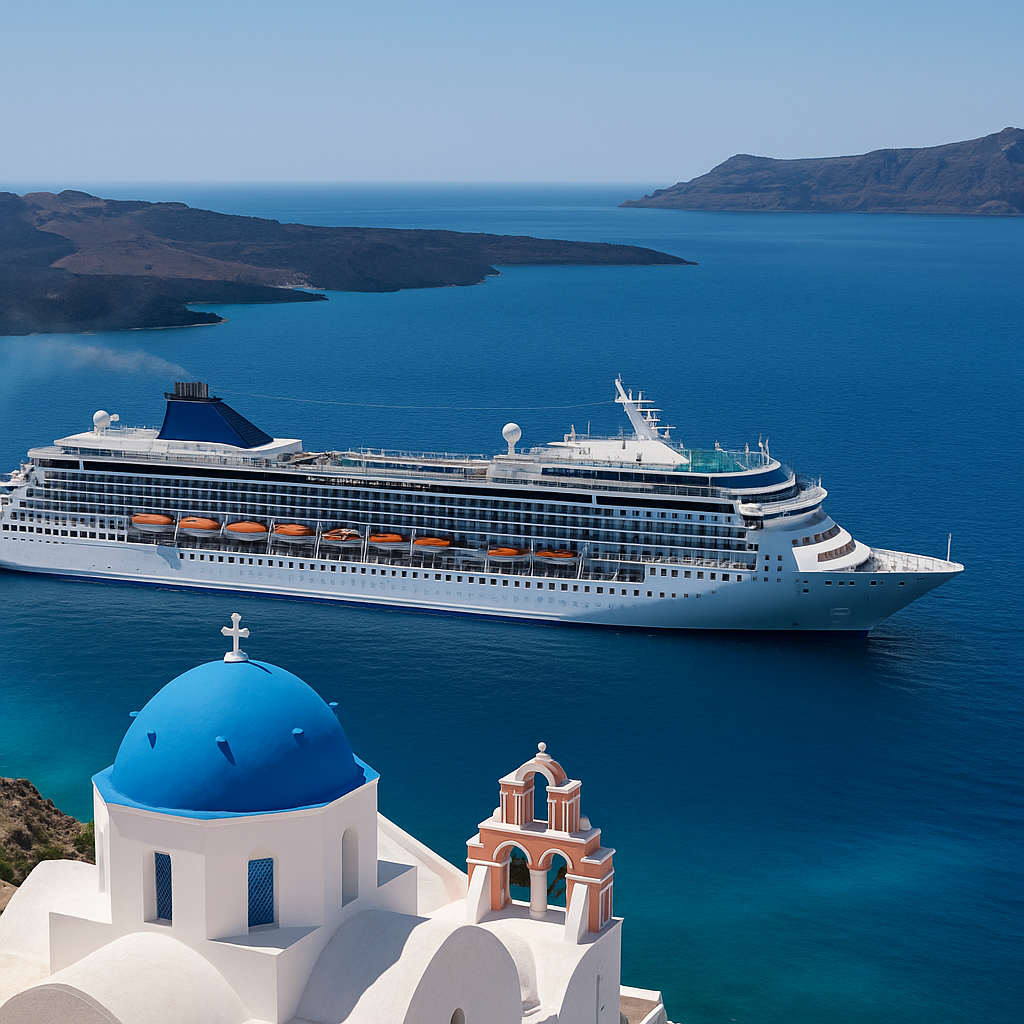Beginning July 1, 2025, Greece will officially implement a seasonal cruise passenger tax ranging from €1 to €20 per person, targeting heavily trafficked islands like Santorini and Mykonos. This policy forms a central part of the country’s renewed efforts to balance tourism growth with environmental sustainability, especially in island regions overwhelmed by cruise traffic.
The Greek Ministry of Tourism announced that the revenue generated—projected at €50 to €100 million annually—will be directed toward improving port infrastructure, funding local municipalities, and supporting broader sustainability efforts across the Aegean and Ionian seas. The law, passed in 2024, responds to growing concerns from residents, environmental groups, and tourism stakeholders about the strain of cruise arrivals on local ecosystems and daily life.
Tiered Cruise Tax Based on Season and Destination
The new levy will apply to every cruise passenger disembarking in Greece, with rates varying based on the destination’s popularity and seasonality. Travelers arriving at Greece’s most famous islands—Santorini and Mykonos—during the high season (July 1 to September 30) will pay the highest rate of €20 per visit. During shoulder months (April, May, and October), the fee will drop to €12, while off-season arrivals (November through March) will pay a reduced €4.
Other cruise destinations across the country—including Corfu, Rhodes, Crete, and lesser-visited islands like Syros and Naxos—will follow a similar model, with low-season fees starting at €1, rising to €3 during shoulder periods, and peaking at €5 in summer.
This approach allows Greece to align taxation with visitor impact, reflecting the seasonal pressures and resource strain unique to each port city or island.
Why the Tax? Balancing Tourism With Preservation
Cruise tourism has played a vital role in Greece’s economic success. According to the Bank of Greece, the country welcomed more than 4.5 million cruise passengers in 2023, with projections set to increase in the coming years.
However, this boom has led to infrastructural overload and environmental degradation—particularly in small island communities not built to handle massive daily inflows of tourists. In Santorini, cruise arrivals can exceed 15,000 passengers a day during peak season, overwhelming narrow pedestrian lanes, public transport, and waste systems.
By implementing this seasonal tax, the Greek government aims to discourage overcrowding during peak periods, redistribute tourism traffic, and incentivize cruise lines to explore alternative, less-trafficked ports. The move is also expected to extend the tourist season, pushing more travel toward the shoulder and off-peak months, which could benefit both local economies and visitor experiences.
Revenue Allocation: Infrastructure, Ports, and Municipal Support
Under the provisions of the new law, the revenue collected from cruise passengers will be distributed among key stakeholders:
- Local municipalities will receive a portion to support community development and maintain basic services impacted by tourism.
- The Ministry of Shipping will oversee upgrades to port terminals, especially in high-volume destinations.
- The Ministry of Tourism will allocate funds toward sustainability programs, digital tourism monitoring systems, and promotional campaigns for lesser-known destinations.
According to iEidiseis, additional investment may also be directed toward smart infrastructure, such as digital systems to track ship arrivals and passenger movements, ensuring better crowd control and service efficiency.
Global Precedent and Regional Trend
Greece joins a growing list of European nations taking action against mass tourism and cruise industry congestion. Cities like Venice, Barcelona, and Amsterdam have introduced cruise restrictions, visitor taxes, and sustainability initiatives to safeguard their urban heritage and ecological balance.
For Greece, this initiative marks a paradigm shift in tourism policy, signaling that economic gain must now be weighed against environmental and cultural preservation.
The Cruise Lines International Association (CLIA), which represents global cruise companies, has expressed cautious support for the policy, noting that “measured solutions that ensure the longevity of cruise tourism and protect destinations are in everyone’s interest.” Most cruise operators are expected to incorporate the tax into their ticketing or port fees, minimizing administrative complexity for passengers.
Broader Strategy: Shaping the Future of Greek Tourism
This cruise tax is just one part of Greece’s broader strategy to create a more sustainable and resilient tourism economy. Recent initiatives by the Ministry of Tourism include:
- Development of “smart island” concepts that blend digital tools with environmental preservation
- Promotion of lesser-known island destinations to distribute tourist volume
- Expansion of eco-certification programs for tourism businesses and accommodations
Tourism Minister Olga Kefalogianni emphasized that the cruise tax “represents a conscious shift toward quality tourism, one that values environmental integrity and local well-being as much as economic return.”
Cruise Season Outlook and Industry Response
With July approaching, cruise operators, port authorities, and local stakeholders are preparing for the rollout. According to Cruise Industry News, Greece remains one of the Mediterranean’s top cruise destinations, and despite the added cost, demand is unlikely to dip significantly.
However, the tax may prompt cruise lines to re-evaluate stop frequencies, increase time spent at fewer destinations, and curate more immersive shore experiences to enhance value for guests.
This could lead to a positive evolution in how cruise tourism operates in the region—one that fosters authentic cultural engagement, minimizes environmental impact, and supports local economies in a more sustainable way.
Final Thoughts
As the global tourism landscape continues to evolve, Greece is stepping forward as a leader in responsible tourism management. By launching this cruise tax, the country not only aims to preserve its treasured islands like Santorini and Mykonos but also to build a future-proof tourism sector—one that benefits visitors and locals alike.
With millions of travelers expected this year, this new policy may well serve as a model for other cruise-heavy nations navigating the delicate balance between profit and preservation.
For more travel news like this, keep reading Global Travel Wire















